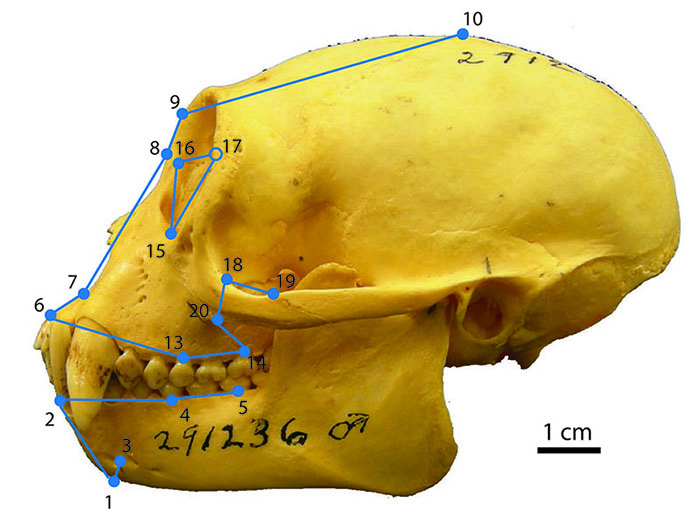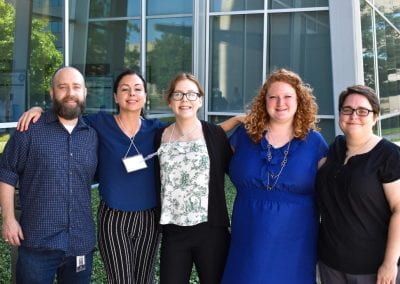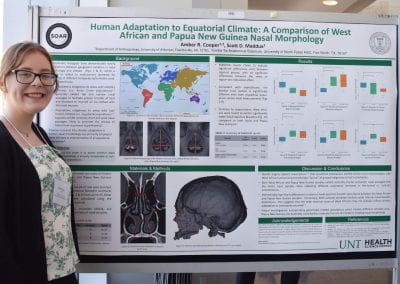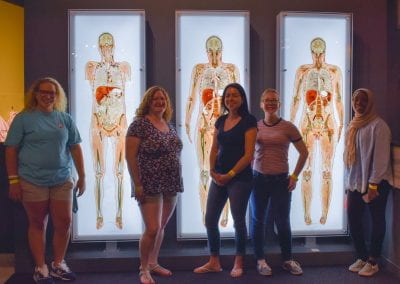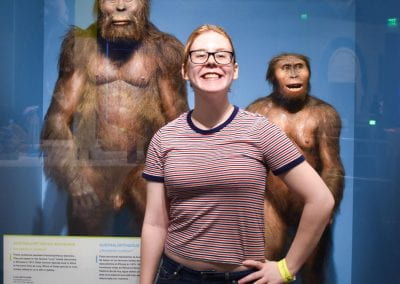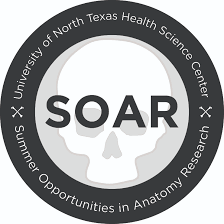 Hi, my name is Amber Cooper and over this past summer, I went on a life-changing journey in Texas. Now, even mentioning Texas will bring to mind images of cowboys and unbearable heat, and I must say those images are quite realistic for the state that lauds the National Cowgirl Museum and Hall of Fame and a record heat wave reaching up to 120 degrees. But setting that aside, there is one place in Texas that will always hold a special place in my heart, the University of North Texas Health Sciences Center (UNTHSC). For three years, the university has hosted the SOAR program, or the Summer Opportunities in Anatomical Research. This program helps underrepresented students pursue anatomical research by providing a foundation into what it’s like being a researcher in Academia. I am proud to say that I was one of these students. Being a first-generation student, every opportunity I can get my hands on is a welcome one. Because of this, I thought I might share my experience so that other underrepresented students can also learn about how to navigate the academic world.
Hi, my name is Amber Cooper and over this past summer, I went on a life-changing journey in Texas. Now, even mentioning Texas will bring to mind images of cowboys and unbearable heat, and I must say those images are quite realistic for the state that lauds the National Cowgirl Museum and Hall of Fame and a record heat wave reaching up to 120 degrees. But setting that aside, there is one place in Texas that will always hold a special place in my heart, the University of North Texas Health Sciences Center (UNTHSC). For three years, the university has hosted the SOAR program, or the Summer Opportunities in Anatomical Research. This program helps underrepresented students pursue anatomical research by providing a foundation into what it’s like being a researcher in Academia. I am proud to say that I was one of these students. Being a first-generation student, every opportunity I can get my hands on is a welcome one. Because of this, I thought I might share my experience so that other underrepresented students can also learn about how to navigate the academic world.
One of the first lessons that the SOAR program taught me was how to stay sane while doing tedious and seemingly monotonous research on a computer. For hours on end, I would sit at a computer, collecting data for my project on climatic adaptation concerning human nasal morphology. From this description one might infer that it was a dull experience, but it was anything but. Doing research made me feel that for the first time, I really belonged to something. I had a purpose to contribute to a vast body of knowledge that millions utilize every day. I learned useful skills, such as how to place XYZ landmarks on 3D models in a program called 3D Slicer. Many anthropologists know how to landmark because it is extremely useful for showing not only how certain features have evolved throughout time, but also for showing the differences between species and individuals. While the learning curve for landmarking was pretty steep, by the time I conquered how to landmark I had also gained an appreciation for the differences and similarities between individuals. Everybody tends to notice the differences between individuals, like how far apart their eyes are, how big their nose is, or what their skin color is. When it really comes down to it though, there are really only very small minute changes that separate one person from another. For example, while landmarking the differences between humans from Inuit, West African, and Papua New Guinean populations, I found that the changes in the skull that separate hot-wet climate populations and cold-dry populations was really only a few centimeters. This discovery really brings perspective about how to see the world around you and the people in it. If someone would have told me that I would change my entire worldview within a span of ten weeks, I wouldn’t believe them, but I did and that’s what makes this experience so life-changing for me.
This program did so much more than prepare me for a career in academia, it also helped me become a better, more open person. That is why I want to share this experience with people, because I want to not only show how there are programs out there to help underrepresented students, but also to change their lives for the better.
If it wasn’t for the Terhune lab and the wonderful people who work in it, I would have never even heard about this program. Every day I think to myself how lucky I am that Dr. Terhune and Caitlin Yoakum (PhD student in the Terhune Lab) let a first-generation college freshman like me into the lab. They were able to help someone with virtually no experience learn what it’s like to be a scientist. Starting out in the Terhune lab gave me a passion for anatomy that made me ecstatic for the SOAR program, and my experiences in the lab helped mold my passion into knowledge about anatomy and morphometrics. More specifically, in the lab I was able to work with 3D models and primate specimens, which helped me acclimate to the computer programs and human cadaver labs of UNTHSC. Thanks to them, I was able to have the best possible experience during the SOAR program, and for that I will be eternally grateful.
[Editor’s note: Amber has more than earned her spot in the Terhune Lab via her hard work and enthusiasm for learning. We’re happy you’re here Amber! -Dr. Terhune]
